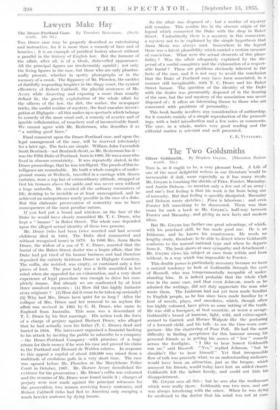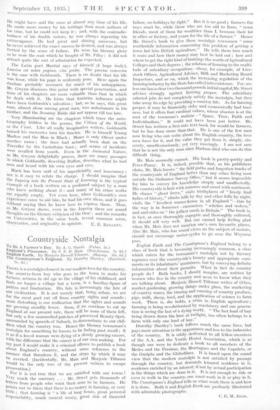The Two Goldsmiths
Oliver Goldsmith. By Stephen Gwynn. (Thornton Butter- worth. 15s.) Tins is, as it ought to be, a very pleasant book. A Life of one of the most delightful writers in our literature would be inexcusable if dull, more especially as it has many rivals. Mr. Gwynn is touching the shields of Prior, Forster, Macaulay, and Austin Dobson—to mention only a few out of an army ; and one's first feeling is that his work is' far from being one of necessity. But that feeling is speedily dissipated. Macaulay and Dobson wrote sketches ; Prior is laborious ; and eVen Forster left something to be discovered. There was thus room for such a book as Mr. Gwynn's, half-way between Forster and Macaulay, and giving us new fads and modern ideas.
But Mr. Gwynn has further one great advantage, of which, with his practised skill, he has made good use. He is an Irishman, and he knows his countrymen. He needs no lengthy study, therefore, to be able to detect where Goldsmith conforms to the normal national type and where he departs from it. The book shows at once sympathy and detachment Mr. Gwynn views his subject at once from within and from without, in a way which was impossible to Forster.
This double power is particularly necessary because we have a natural tendency to look at Goldsmith through the eyes of Boswell, who was temperamentally incapable of under- standing him. It is indeed probable that the whole Chub was in the same case, and that even Johnson, much as he admired the writings, did not duly appreciate the man whp wrote them. The Irishman had not yet been made familial to English people, as he has since been made familiar by host of novels, plays, and anecdotes, which, though often too highly coloured, have given us some inkling of the truth. He was still a foreigner, at best eccentric, at worst a savage. Goldsmith's brand of humour, light, wild, and extravagant, seemed 'to Garrick and Horace Walpole like the posturing of a forward child, and his talk—to use the tune-worn com- parison—like the chattering of Poor Poll. He had the same difficulty in finding acceptance for this humour 'among his personal friends as in getting his scenes of " low " comedy across the footlights. " I like to hear holiest Goldsmith run on," said Boswell. " Yes," replied Johnson, " but he shouldn't like to hear himself." Yet that irresponsible flow of talk was precisely what, to an understanding audience, would have been an attraction, just as the brogue, which annoyed his friends, would today have lent an added charm. Goldsmith felt .the failure keenly, and could not hide his disappointment. '
Mr. Gwynn sees all this ; but • he sees also the weaknesses which were really there. Goldsmith was two men, and one was always interfering with the other, When he was dying he confessed to the doctor that his mind was not at ease.
He might have said the same at almost any time of his life. He made more money by his writings than most authors of his time, but he could not keep it ; and, with the .contradie- toriness of his double nature, he was always repenting his extravagance. He had great and shining successes, but he never achieved the exact success he desired, and was always fretted by the sense of failure. He wore his literary glory as lie wore the coat which he bought of Mr. Filby : it did not attract quite the sort of admiration he expected.
The Latin poet Martial says of himself (I hope truly), Lasciva est nobis pagina, vita proba. The precise converse is the case with Goldsmith. There is no doubt that his life was loose; while his page is uniformly pure. Here again the dualism probably' accounts for much of his unhappiness. Mr. Gwynn discusses this point with special penetration, and alone of his chapters are more valuable than that in which he deals with it. He hints that feminine influence might have been Goldsmith's salvation ; but, as he says, this great Man, almost alone among great men, was unfortunate in his mother, and the Jessamy Bride did not appear till too late.
Very illuminating are the chapters which trace the auto- biography hidden in the poems, the Citizen of the World, or the Vicar. Like all really imaginative writers, Goldsmith turned his memories into his fancies. He is himself Young Marlow and the Man in Black ; Moses is only Oliver under another name ; the door had actually been shut on the TraVeller by the Carinthian boor and scores of incidents ; were recalled from youth. Even in the Animated Nature, as Mr. Gwynn delightfully proves, there are many passages in Which Goldsmith, deserting Buffon, describes what, he had seen and heard with his own eyes and ears. Mitch has been said of his superfiCiality and inaccuracy ; nor is it easy to refute the charge. I should imagine that the Inquiry into the Present State of Learning is the typical example of a book written on a profound subject by a man who knew nothing about it : and many of his other works are equally empty. Yet even here, , when Goldsmith's own experience came to aid him, he had his own ideas, and it goes without saying that he knew how to express them. Thus, M'. Gwynn shows, even in the itlayirli there are sound thoughts on the1iterary criticism of the time ; and the remarks on Universities, in the same book, reveal common sense, observation, and originality in opinion • E. E. KELLETT.







































 Previous page
Previous page